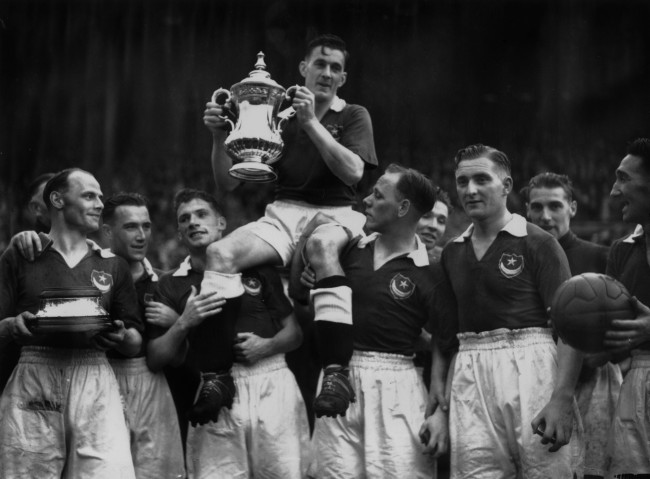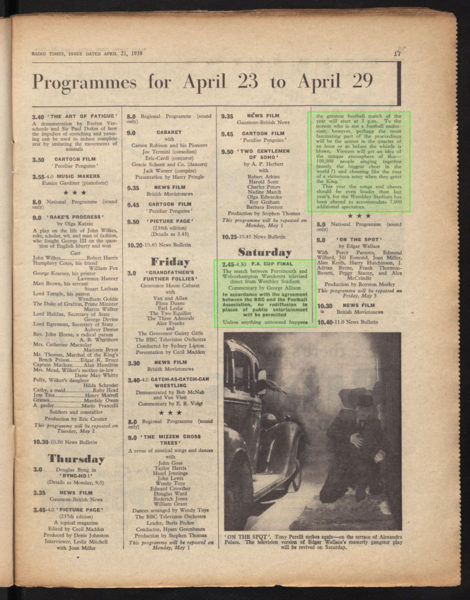1939 FA Cup Final (partially found footage of football match; 1939): Difference between revisions
| Line 31: | Line 31: | ||
1939facupfinal2.png|''Radio Times'' issue listing the match. | 1939facupfinal2.png|''Radio Times'' issue listing the match. | ||
</gallery> | </gallery> | ||
==See Also== | ==See Also (Early BBC Television Media)== | ||
*[[Ann and Harold (lost early BBC drama television series; 1938)]] | |||
*[[Cook's Night Out (lost early BBC cooking show; 1937)]] | |||
*[[First Aid (lost early BBC medical show; 1937)]] | |||
*[[Foundations of Cookery (lost early BBC cooking show; 1939)]] | |||
*[[Marcel Boulestin television shorts (lost early BBC programs; 1937-1939)]] | |||
*[[RCA recording of BBC Television Service (found footage of pre-Second World War BBC television broadcast; 1938)]] | |||
*[[Sea Stories (lost early BBC talk show; 1936-1937)]] | |||
*[[Spelling Bee (lost early BBC game show; 1938)]] | |||
*[[The Care of Your Car (lost early BBC motoring show; 1947)]] | |||
*[[The Wasp's Nest (lost early BBC television adaptation of Agatha Christie short story; 1937)]] | |||
==See Also (Early Sports Television Media)== | |||
*[[1931 Epsom Derby (lost televised footage of horse racing event; 1931)]] | *[[1931 Epsom Derby (lost televised footage of horse racing event; 1931)]] | ||
*[[1934 Philo T. Farnsworth broadcasts (lost early television demonstrations; 1934)]] | *[[1934 Philo T. Farnsworth broadcasts (lost early television demonstrations; 1934)]] | ||
Revision as of 08:55, 30 October 2021
The 1939 FA Cup Final cumulated the end of the 64th FA Cup season. Featuring Portsmouth facing and winning its first FA Cup against Wolverhampton Wanderers at Wembley Stadium in front of an audience of 99,370,[1] this marked the second instance the FA Cup was fully televised, and inevitably the last before the outbreak of the Second World War.
Background
Both Portsmouth and Wolverhampton Wanderers, as First Division members, entered the tournament in the Third Round proper. Portsmouth defeated Lincoln City, West Bromwich Albion, West Ham United, defending champions Preston North End, and Huddersfield Town to reach the Final. Meanwhile, Wolverhampton Wanderers' consisted of it overcoming Bradford Park Avenue, Leicester City, Liverpool, Everton and Grimsby Town.[2] Prior to the Final, Portsmouth had never won the FA Cup,[3] whereas Wolverhampton Wanderers had won the trophy twice.[4] Wolves were also deemed the favourites for this encounter; aside from displaying a dominant FA Cup campaign, including beating Grimsby Town 5-0 in the Semi-Finals, the club had also challenged for the First Division title, finishing runners-up. In contrast, Portsmouth had battled relegation.[5]
Meanwhile, the BBC had successfully broadcast the 1938 FA Cup Final in full for its Television Service.[6] Once again it had received permission from the Football Association (FA) to televise the match, with the condition that there would be no rediffusion in terms of public entertainment. Wembley had also being modified so that it could hold another 7,000 fans, enough to theoretically hold 100,000.[7][8] Ultimately, the attendance was just shy of that by 630.
Despite Wolves being deemed the favourites, it was Portsmouth that controlled play, winning its first FA Cup with a 4-1 win. Herbert Barlow and John Anderson scored goals for the club in the first half. In the second, Henry Parker added two more, with the sole strike from Wolverhampton's Richard Dorsett occurring between them. Both clubs would again win the FA Cup, Portsmouth taking until 2008 to do so.[9] Pompey would also hold the dubious honour of holding the FA Cup trophy the longest uninterrupted at seven years. This was because of the outbreak of the Second World War, which suspended English football, and also caused the BBC to cease television transmissions.[10][11] The FA Cup would not be held until one year after the War, in 1946.
Availability
Like other early BBC television broadcasts, the 1939 FA Cup was broadcast live and was not recorded. Therefore, any televised footage of the event is now permanently missing. However, the match itself is not fully missing, with highlights from British Movietone and British Pathé still being publicly available.
Gallery
Videos
Images
See Also (Early BBC Television Media)
- Ann and Harold (lost early BBC drama television series; 1938)
- Cook's Night Out (lost early BBC cooking show; 1937)
- First Aid (lost early BBC medical show; 1937)
- Foundations of Cookery (lost early BBC cooking show; 1939)
- Marcel Boulestin television shorts (lost early BBC programs; 1937-1939)
- RCA recording of BBC Television Service (found footage of pre-Second World War BBC television broadcast; 1938)
- Sea Stories (lost early BBC talk show; 1936-1937)
- Spelling Bee (lost early BBC game show; 1938)
- The Care of Your Car (lost early BBC motoring show; 1947)
- The Wasp's Nest (lost early BBC television adaptation of Agatha Christie short story; 1937)
See Also (Early Sports Television Media)
- 1931 Epsom Derby (lost televised footage of horse racing event; 1931)
- 1934 Philo T. Farnsworth broadcasts (lost early television demonstrations; 1934)
- 1936 Summer Olympics (lost television coverage of Berlin Games; 1936)
- 1937 FA Cup Final (partially found footage of football match; 1937)
- 1937 International Imperial Trophy Race (lost footage of motor race; 1937)
- 1937 Wimbledon Championships (partially found footage of tennis tournament; 1937)
- 1938 Ashes Series (partially found footage of international test cricket match; 1938)
- 1938 FA Cup Final (partially found footage of football match; 1938)
- 1938 Pennsylvania Quakers football season (lost early televised college football games; 1938)
- 1953 British Grand Prix (partially found footage of Formula One race; 1953)
- 1960 Daytona Races (lost CBS and NBC televised footage of NASCAR prelude events to Daytona 500; 1960)
- Arsenal vs Arsenal Reserves (lost footage of early BBC televised football match; 1937)
- Brooklyn Dodgers 2-5 6-1 Cincinnati Reds (lost footage of MLB doubleheader; 1939)
- Brooklyn Dodgers 23-14 Philadelphia Eagles (lost footage of NFL game; 1939)
- Catch-As-Catch-Can Wrestling (lost early BBC televised professional wrestling matches; 1938-1939; 1946-1947)
- Columbia Lions 1-2 Princeton Tigers (partially found footage of college baseball game; 1939)
- England 0-1 Scotland (partially found international football match; 1938)
- England 16-21 Scotland (partially found footage of rugby match; 1938)
- Fordham Rams 34-7 Waynesburg Yellow Jackets (lost footage of college football game; 1939)
- Indianapolis 500 WFBM-TV Broadcasts (lost racing footage; 1949-1950)
- The Boat Race 1938 (partially found footage of rowing race; 1938)
References
- ↑ Sporting Chronicle detailing Portsmouth's 1939 FA Cup victory. Retrieved 03 May '21
- ↑ Rec.Sport.Soccer Statistics Foundation listing of the 1938-39 FA Cup results. Retrieved 03 May '21
- ↑ Portsmouth website discussing the club's trophy successes. Retrieved 03 May '21
- ↑ Wolverhampton Wanderers website discussing the club's trophy successes. Retrieved 03 May '21
- ↑ Pompey Chimes discussing the match and Wolverhampton Wanderers being deemed the favourites going in. Retrieved 03 May '21
- ↑ BBC article concerning televising the 1938 FA Cup Final. Retrieved 03 May '21
- ↑ BBC Genome archive of Radio Times issues, listing the match, the BBC and FA's agreement, and Wembley's expansion. Retrieved 03 May '21
- ↑ Issue 812 of Radio Times, listing the match. Retrieved 03 May '21
- ↑ BBC Sport noting Portsmouth's second FA Cup win in 2008. Retrieved 03 May '21
- ↑ IWM detailing English football's suspension following the outbreak of the Second World War. Retrieved 03 May '21
- ↑ BBC Handbook for 1940 extract published on Transdiffusion, discussing BBC Television Centre ceasing all transmissions following the outbreak of the Second World War. Retrieved 03 May '21

